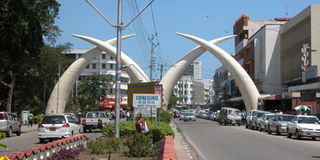Short-stay homes in Mombasa to pay Sh25,000 annual licence fee

Mombasa Governor Abdulswamad Nassir is seeking to introduce new revenue streams that will require owners of shorty-stay homes to pay up to Sh25,000 annually.
What you need to know:
- Mombasa Governor Abdulswamad Nassir said that the new tax will allow the county to provide crucial services including installation of surveillance cameras for security purposes saying “It is crucial to know the kind of businesses going on in different areas.”
- However, some owners of the homestay businesses termed the Sh25,000 a punitive tax.
Mombasa Governor Abdulswamad Nassir is seeking to introduce new revenue streams that will require owners of shorty-stay homes to pay up to Sh25,000 annually depending on the number of rooms.
In the Mombasa County Finance Bill, 2024, which passed its first reading by Members of the Mombasa County Assembly a week ago, the alternative accommodation providers will have to pay the new rates to increase revenue streams to the county government if the Bill sails through.
Agricultural enterprises have also been roped in.
According to the document, a fully serviced/furnished apartment/Airbnb with three bedrooms and above will be charged Sh25,000.
A large high standard lodging house or Hotel classified under D Class with over 100 rooms will be charged Sh250,000 while a medium high standard lodging house or hotel under D Class with 41 to 100 rooms will part with Sh150,000.
Small High Standard Lodging House or Hotel D Class up to 40 rooms will pay Sh85,000 while Floating Restaurants or dhows part with Sh45,000.
“Large Eating House, Snack Bar, Tea House "Hotel" no lodging and no alcohol served with capacity over 20 customers Sh25,000,” the new regulation states.
In an interview with the Nation, Governor Nassir and his Tourism, Trade County Executive Mohammed Osman said the owners of the alternative accommodation should pay taxes like their counterparts in the hotel industry.
Mr Nassir said [business taxation] has to be seen to be fair across the board. “If everyone else from the guest houses to the lodges is paying for licensing, it is only right for (homestay owners) to also pay levies to the county government of Mombasa,” he said.
Mr Osman said there was sufficient public participation during preparation of the Bill before it passed muster.
Double taxation
“Counties like Nairobi charge Sh25,000 for permits for (homestay apartments). There is no excuse for those engaged in similar business in Mombasa not to pay taxes. They need to understand why they pay the Tourism Revenue Authority and why we impose county levies,” he added.
Two months ago Mr Nassir told a meeting of hospitality investors that he will ensure fairness in the industry.
“The issue was raised by the industry players in the tourism sector who also felt that the playing field was uneven and wanted it levelled since hotels pay hefty sums for the license to operate,” said Mr Nassir.
The Governor added that the new tax will allow the county to provide crucial services including installation of surveillance cameras for security purposes saying “It is crucial to know the kind of businesses going on in different areas.”
However, some owners of the homestay businesses termed the Sh25,000 a punitive tax.
“In as much as the County Government is moving to rope us into its revenue plans, this is unfair,” said Peter Wachira who owns three such apartments.
Coast Holiday Homes chief executive Habel Mwakio said the new levies will kill their ventures.
“In Kenya, we have a lot of double taxation. You find a businessman paying the national government (Tourism Revenue Apartment) an average of Sh20,000 a year, then the county government comes up with the same figure. This is no way to conduct a business,” Mr Mwakio reasoned.
He said the sector was struggling with a majority of owners opting out due to stiff competition from new apartments and emerging new businesses.
“Mr Nassir has introduced a punitive tax since we indirectly employ housekeepers, nannies, masseuses, chefs, drivers, cleaners, caretakers, and tour guides. Where do these people go should we be forced to close down?” Mr Mwakio posed.
Last year, the Tourism Fund urged businesses to register their ventures after it emerged that about 40,000 Airbnb hosts were in operation in Kenya, but the agency has only a record of 400 on its registry.
The national government through the Tourism Fund targets to impose a two-percent levy on income earned by homestay business owners.
All for one, tax for all
Other new levies in the Bill are in the agricultural sector where farmers who rear pigs (1 to 50) will pay Sh500. Those with 50 and above will part with Sh1,000.
“Approval of dairy zero-grazing units, a piggery, poultry rearing units will cost Sh1,000, dog kennels and egg incubators Sh300 and Sh200 respectively,” the county Finance Bill states.
Licensing of animal rearing in urban areas dairy cattle and camels will cost Sh1,000 per head, goats and sheep Sh200 per head, above 200 birds Sh200 per flock.
Large agriculture producers, processors, dealers and exporters above 10 employees will part with Sh100,000. Medium agriculture producers, processors, dealers and exporters with 6 to 10 employees Sh80,000 while small agriculture producers, processors, dealers and exporters up to five employees pay Sh30,000 annually.
Governor Nassir is also collecting fees from the education sector after imposing a price on registration, inspection, levies, admission and hiring.
For instance, the inspection of childcare facilities (private schools) per annum includes Sh7,000 for schools that charge school fees below Sh20,000 per annum.
Tier 2, Sh17,500 for schools that charge fees between Sh45,000 per annum per child. Tier 3, Sh35,000 levy for schools charging Sh45,000 per annum per child.





